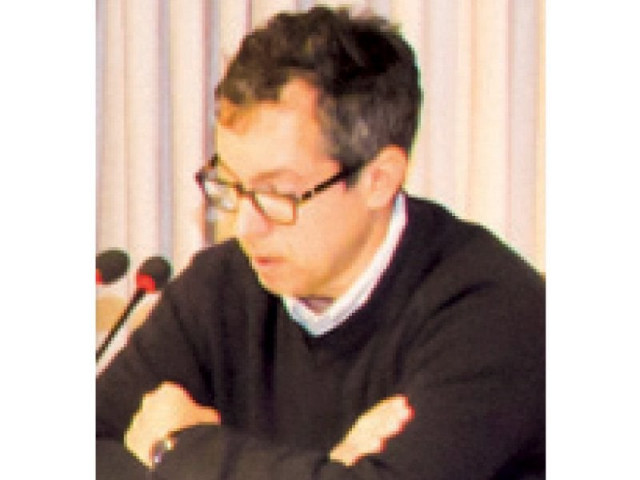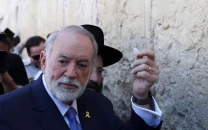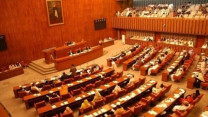Confronting cultural hegemony: Literature from the peripheries elbowed out in global mass market
Commodification of literature pose challenges for foreign-language writers: Brazilian novelist.

An attentive audience listens to a lecture by Carvalho. PHOTO: EXPRESS
From the tone and tenor of his talk, the Brazilian author Bernando Carvalho appears to be a soft-spoken, principled rebel. His rebellion is refreshing in a world where writers often opt for obsequiousness rather than confrontation with cultural hegemony.
Carvalho, who is a journalist and playwright in addition to being an award-winning writer with 10 novels to his name, is currently visiting Pakistan to attend the upcoming Karachi Literature Festival (KLF) 2014. But before he could travel to the city by the sea, the Brazilian embassy invited him to deliver a lecture near the Margalla Hills. at Kuch Khaas, on Wednesday.
His resistance is quite multi-faceted and there are avenues of thought in his monologue that he himself finds paradoxical. Such is a thinker’s struggle in the contemporary and commercial 21st century. In the case of Carvalho, it is a thinker who is trying simultaneously to salvage the independence of foreign languages against the hegemonic onslaught of English and to disagree with the construct of identity or nationalistic literature, all the while denouncing the commodification of literature by a global mass market.

In a stimulating and insightful talk, Carvalho spoke eloquently about the way a mass-market attitude has negatively affected the writings from countries, such as Brazil, which occupy a peripheral position in world literature.
According to Carvalho, the hegemony of English language has created an atmosphere where non-native speakers are accepted mostly only if they write in English incorporating some of their local slang or ethnic experience. At the same time, the Anglo-Saxon world uses this multiculturalism as an excuse to not translate works from other languages to English, he said.
Carvalho gave examples of 19th century writer Machado de Assis, arguably the best Brazilian writer ever, and the 20th century Argentinean writer Jorge Luis Borges during his talk. He said these writers used the Western literary canon but transformed it with their own local sensibility to create a new and exceptional body of writing that was reflective and relevant domestically. They were able to use their peripheral status as an asset, Carvalho said.
Contemporary writers in Brazil, or South Asia for that matter, may not have that luxury anymore because “things change when literature goes global and becomes a mass-market product,” he added
“Now, writers have to conform to market rules to ensure their works can be sold and read globally. This global influence can be so cruel that non-native English writers may consider writing in their mother languages inferior and may prefer writing in English instead.” So-called demand-driven “excellence,” not exceptional creativity, drives the production of literature. “[The global market] causes a shift in the peripheral writer,” Carvalho said. “He must cease to value exception and pursue excellence.” He said he is not fundamentally against non-native English speakers writing in English but he is against it being enforced on foreign writers by the market.
Carvalho said he believes in the sanctity of a language but at the same time does not agree with identity or nationalistic literature. For my own writings, I’m against nationalistic literature because, growing up under a military dictatorship in Brazil, I associate it with authoritarianism, he added.
“The internet tends to support writing in English. It is also problematic that the internet culture considers the most read pieces as the best ones, instead of the better quality pieces.”
At the KLF 2014, Carvalho will be the first Brazilian writer and the only Latin American representative, according to the Brazilian embassy. He will be speaking at a session on “The World of the Novel,” which will be moderated by Pakistani author Shandana Minhas.
“[Carvalho’s participation in the KLF] will be a great opportunity for building bridges across the Pakistani and the Brazilian literary communities,” the Brazilian embassy said in a statement.
Published in The Express Tribune, February 6th, 2014.



















COMMENTS
Comments are moderated and generally will be posted if they are on-topic and not abusive.
For more information, please see our Comments FAQ